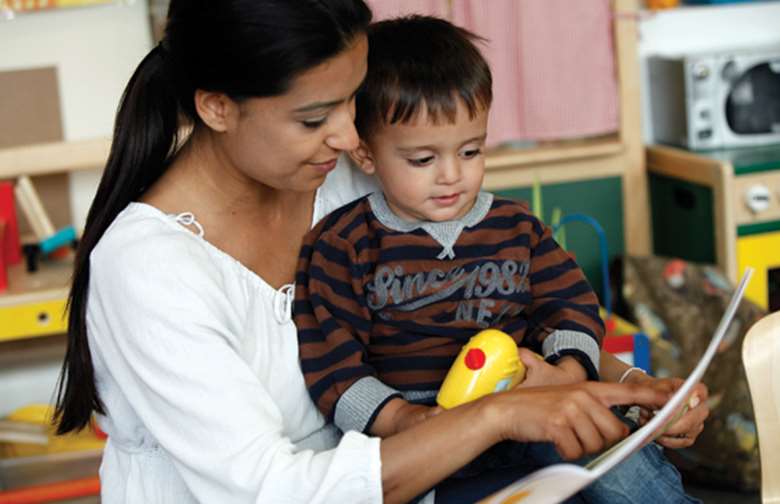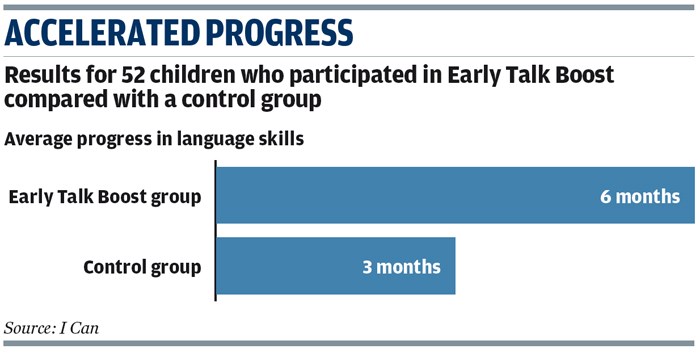How group work boosts children's speech and language progress
Emily Rogers
Tuesday, November 10, 2015
Programme improves the language and communication skills of three- to four-year-olds with delayed language development.

PROJECT
Early Talk Boost
FUNDING
£700,000 from UBS Optimus Foundation over two years from January this year to develop, pilot and evaluate the programme. Early years settings pay £450 per trainee for a starter kit, including an intervention manual, parent training resources and 10 storybook sets, as well as training costs
BACKGROUND
Children entitled to free school meals and living in deprived areas are 2.3 times more likely than their peers to have speech, language and communication difficulties, according to 2012 Department for Education research.
Children's communication charity I Can estimates a quarter of the differences in language ability between three-year-olds are due to environmental factors such as reduced access to libraries and learning activities. It has been working to narrow this gap through Early Talk, a workforce development programme building professionals' skills in developing children's early language.
Last year, in response to demand from these professionals, it sought funding to develop and trial a programme for children. "We wanted to develop something professionals would find practical and easy to administer, but would have a significant impact on the large number of children in settings with environmental language delay," explains I Can's lead communication adviser and Early Talk Boost project manager Louisa Reeves.
ACTION
Early Talk Boost is designed for three- to four-year-olds who don't have a language impairment, but haven't had the opportunity to develop age-appropriate language skills at home. "The criteria for access to speech and language support are sometimes quite challenging in the early years," says Reeves. "And often these are children whose parents struggle to get them to appointments."
Early years staff get a day's training to deliver the programme and as part of their training pack receive a "tracker tool", which they can use to measure children's language and communication levels and establish who would benefit most. These children may have poor vocabulary, or difficulty in listening, paying attention, explaining, describing or building sentences.
Up to eight children are allocated to an Early Talk Boost group, which meets three times a week for nine weeks. Themed sessions follow a set format with two games or activities, a song and a book. The first two weeks focus on increasing children's understanding of the importance of attention and listening, and the following weeks cover vocabulary, building sentences and re-telling stories.
A series of eight storybooks accompany the programme, which children read several times in their groups before taking them home to read with parents. "One of the greatest things is how parents have opened up to this, got involved and seen the impact on their children's language," says Reeves.
The programme has been piloted in St Helens in Merseyside, Sunderland, east London and Essex since September last year, benefitting 140 children in seven or eight early years settings in each of these areas.
OUTCOME
An evaluation of the pilot involved 51 children who had participated in the programme and 29 children from nurseries that hadn't taken part, in St Helens, Sunderland and London and the South East.
External speech and language therapists and students assessed participating children's language development before and after the programme, using an assessment tool called the Preschool Language Scale (PLS-4).
The results, analysed by City University professor Tim Pring, show a statistically significant difference between the two groups in the progress made. The Early Talk Boost group made an average of six months' progress following the nine-week intervention, double the three months' progress made by control group children over the same period.
Of 37 parents, 95 per cent said the programme had made a difference to their children's language and communication and they would change the way they talked to their child as a result. Meanwhile, 76 per cent of 28 children said they were happy telling stories after the programme, up from 31 per cent before.

If you think your project is worthy of inclusion, email supporting data to derren.hayes@markallengroup.com




